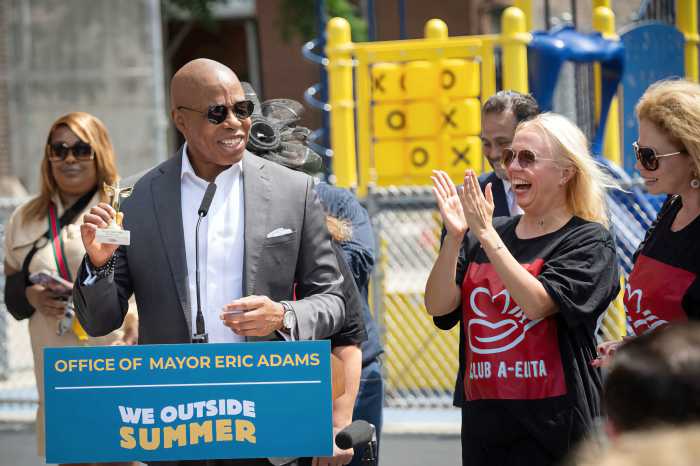Comptroller Thomas DiNapoli brings along ten on nondiscrimination; shareholder push prevails on nine more
Seven new Fortune 1000 corporations added policies barring discrimination and harassment based on sexual orientation and gender identity in response to outreach during the past year from the New York State Comptroller’s Office.
An additional three incorporated employment protections more narrowly tailored to its gay and lesbian employees.
According to information released this week by Comptroller Thomas DiNapoli’s office, more than 130 corporations were contacted. Among 12 major targets that initially offered no response or a negative answer to those efforts, nine have since come around after shareholder filings aimed at reversing their resistance. Five of the nine put in place protections based on both sexual orientation and gender identity. The other four implemented sexual orientation nondiscrimination policies only.
The roughly $146 billion Common Retirement Fund that covers pension obligations for retired state employees as well as those of numerous of municipalities across New York is managed by the Comptroller’s Office, making it one of the largest institutional investors in the US. Dating back to the 1990s, the office has used its market power to press for employment fairness policies –– first for gay and lesbian employees and, in recent years, for transgender workers as well.
DiNapoli, since taking office in 2007, has continued that push.
Both the state and city comptrollers have made significant headway over the past two decades, first through outreach and, when that falls short, by leading shareholder resolution efforts.
In a written statement commenting on the new policies implemented in the wake of his office’s most recent efforts, DiNapoli said, “I commend these companies for taking this important step toward promoting a workplace environment that ensures that employment decisions are based on individual qualifications, merit, and ability, and not on prejudice.”
Companies that instituted comprehensive sexual orientation and gender identity workplace protections in response to letters from DiNapoli include PolyOne Corporation, Sanderson Farms, Total System Services, Inc., Beckman Coulter, Plains Exploration & Production Company, Valmont, and Nextel Corporation. Those who responded with sexual orientation policies only are Pool Corporation, Packaging Corporation, of America, and Cameron Corporation.
Of the nine companies that came around once a shareholder effort was launched, Amphenol, LifePoint Hospitals, Werner Enterprises, Catalyst Health Solutions, and CF Industries Holdings added sexual orientation and gender identity policies. Protections for gay and lesbian employees were put in place at Quanta Services, Danaher, Roper Industries, and Noble Energy.
According to the Comptroller’s Office, shareholder activists are in “ongoing dialogue” with Universal Health Services regarding changes to its policies.
Shareholder resolutions were voted on at ExxonMobil, where a 20 percent favorable level was reached, and at American Financial Group, where just over a quarter of shares were voted for a policy change. Though both votes fell well below the majority required, such support levels are considered unusually high for resolutions not sponsored by boards of directors, and companies often act to take an issue off the table before shareholder activists gain this degree of momentum.
The shareholder effort aimed at ExxonMobil has been a multi-year push –– one adamantly resisted by that company’s board.
The Corporate Equality Index compiled annually by the Human Rights Campaign (HRC) rates the nation’s largest companies according to an array of LGBT workplace fairness indicators, including nondiscrimination policies, domestic partnership parity for gay and lesbian couples, transgender-appropriate health care coverage, responsible marketplace and community behavior, and support for LGBT employee groups.
The Comptroller’s Office and other leading institutional investors pressing for workplace progress have worked with HRC in lobbying corporate America, but Eric Sumberg noted that under federal Securities and Exchange Commission (SEC) regulations, matters such as employee benefits are considered “ordinary business” delegated to management and not subject to shareholder action.
“However, the Fund has argued that when you are discussing discrimination, that discussion also encompasses the allocation of benefits,” Sumberg said in an email message. “A number of companies have interpreted policies aimed at eradicating discrimination based on sexual orientation as encompassing equal distribution of employee benefits.”
HRC’s index showed that the number of major companies scoring a perfect 100 percent increased from 305 to 337 during the past year.
As with other activists pressing for nondiscriminatory policies in corporate America, DiNapoli argued that they are in the best interests of corporations –- and by extension, their shareholders, including the State Common Retirement Fund.
“Numerous studies have shown that it is good business practice for companies to promote diversity in the workplace,” he said in announcing the corporations that recently changed their policies. “Companies that prohibit discrimination based on sexual orientation and gender identity draw from the widest pool of talent possible, and that's a benefit for employees and employers alike.”

































